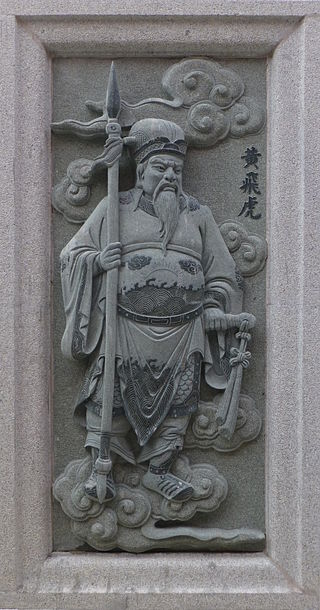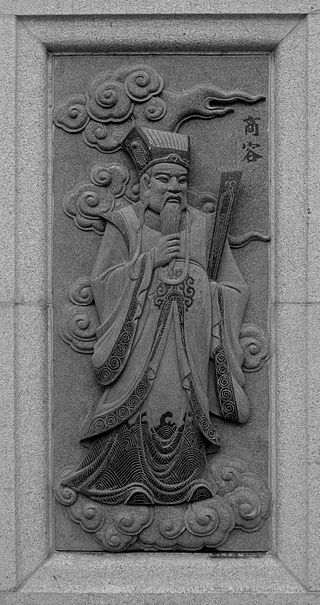Related Research Articles

The Shang dynasty, also known as the Yin dynasty, was a Chinese royal dynasty that ruled in the Yellow River valley during the second millennium BC, traditionally succeeding the Xia dynasty and followed by the Western Zhou dynasty. The classic account of the Shang comes from texts such as the Book of Documents, Bamboo Annals and Records of the Grand Historian. Modern scholarship dates the dynasty between the 16th and 11th centuries BC, with more agreement surrounding the end date than beginning date.

Emperor Hui of Han, born Liu Ying (劉盈), was the second emperor of the Han dynasty. He was the second son of Emperor Gaozu, the first Han emperor, and the only son of Empress Lü from the powerful Lü clan. Emperor Hui is generally remembered as a somewhat weak character dominated and terrorized by his mother, Empress Lü, who became Empress Dowager after she encouraged her husband to command personally the war against Ying Bu, in which he died eventually from an arrow wound sustained during the war.

Oracle bones are pieces of ox scapula and turtle plastron which were used in pyromancy – a form of divination – during the Late Shang period in ancient China. Scapulimancy is the specific term if ox scapulae were used for the divination, plastromancy if turtle plastrons were used. A recent count estimated that there were about 13,000 bones with a total of a little over 130,000 inscriptions in collections in China and some fourteen other countries.

Wu Ding ; personal name Zi Zhao (子昭), was a king of the Chinese Shang dynasty who ruled the central Yellow River valley c. 1250 BC – c. 1200 BC. He is the earliest figure in Chinese history mentioned in contemporary records. The annals of the Shang dynasty compiled by later historians were once thought to be little more than legends until oracle script inscriptions on bones dating from his reign were unearthed at the ruins of his capital Yin in 1899. Oracle bone inscriptions from his reign have been radiocarbon dated to 1254–1197 BC ±10 years, closely according with regnal dates derived by modern scholars from received texts, epigraphic evidence, and astronomical calculations.

King Zhou was the pejorative posthumous name given to Di Xin of Shang or Shou, King of Shang, the last king of the Shang dynasty of ancient China. He is also called Zhou Xin. In Chinese, his name Zhòu also refers to a horse crupper, the part of a saddle or harness that is most likely to be soiled by the horse. It is not to be confused with the name of the succeeding dynasty, which has a different character and pronunciation.

The Investiture of the Gods, also known by its Chinese names Fengshen Yanyi (Chinese: 封神演義; pinyin: Fēngshén Yǎnyì; Wade–Giles: Fêng1-shên2 Yan3-yi4; Jyutping: Fung1 San4 Jin2 Ji6) and Fengshen Bang (封神榜), is a 16th-century Chinese novel and one of the major vernacular Chinese works in the gods and demons (shenmo) genre written during the Ming dynasty (1368–1644). Consisting of 100 chapters, it was first published in book form between 1567 and 1619. Another source claims it was published in a finalized edition in 1605. The work combines elements of history, folklore, mythology, legends and fantasy.

Jiang Ziya, also known by several other names, was a Chinese military general, monarch, strategist, and writer. He played a crucial role in helping King Wen and King Wu of the Zhou dynasty overthrow the Shang dynasty in ancient China. After their victory at the Battle of Muye, Jiang continued to serve as a minister for the Zhou. He remained loyal to the regent, the Duke of Zhou, during the Rebellion of the Three Guards. Following the Duke's punitive campaigns against the Dongyi, Jiang was granted the territory he conquered, which became the marchland of Qi. He established his seat in Yingqiu. Jiang Ziya is also celebrated as one of the main heroes in the classic Chinese novel Investiture of the Gods.

The Battle of Muye, Mu, or Muh was fought between forces of the ancient Chinese Shang dynasty led by King Zhou of Shang and the rebel state of Zhou led by King Wu. The Zhou defeated the Shang at Muye and captured the Shang capital Yin, marking the end of the Shang and the establishment of the Zhou dynasty—an event that features prominently in Chinese historiography as an example of the Mandate of Heaven theory that functioned to justify dynastic conquest throughout Chinese history.

The end of the Han dynasty was the period of Chinese history from 189 to 220 CE, roughly coinciding with the tumultuous reign of the Han dynasty's last ruler, Emperor Xian. It was followed by the Three Kingdoms era. During the end of the Han dynasty, the country was thrown into turmoil by the Yellow Turban Rebellion (184–205). Meanwhile, the Han Empire's institutions were destroyed by the warlord Dong Zhuo and fractured into regional regimes ruled by various warlords, some of whom were nobles and officials of the Han imperial court. The warlord Cao Cao took control of Emperor Xian and his court in 196 and began gradually reunifying the empire. Cao Cao ostensibly operated under Emperor Xian's rule, though in reality the emperor was a hostage.

Mei Bo was an official of Shang dynasty and was killed by Di Xin, King Zhou of Shang.

Daji (Chinese: 妲己; pinyin: Dájǐ; Wade–Giles: Ta2-chi3; Jyutping: Taan2 Gei2) was the favourite consort of King Zhou of Shang, the last king of the Shang dynasty in ancient China. In legends and fictions, she is portrayed as a malevolent fox spirit who kills and impersonates the real Daji. Her identification as a fox spirit seems to have originated from at least the Tang dynasty. These accounts have been popularized in works such as the Wu Wang Fa Zhou Pinghua (武王伐紂平話), the Fengshen Yanyi, and the Lieguo Zhi. She is considered a classic example of how a beautiful femme fatale can cause the downfall of a dynasty in Chinese culture.

Huang Feihu is a fictional character in the Chinese epic fantasy novel Fengshen Bang. Originally known as Prince Wucheng of the Shang dynasty, he defects to Xiqi, a vassal state under Shang, after the tyrannical King Zhou of Shang caused the death of his wife. He brings along his two younger brothers, three sons, four close friends, and hundreds of followers loyal to him. Huang Feihu later participates in the campaign led by King Wu of the Zhou dynasty to overthrow King Zhou of Shang. He is killed in action during a battle against the Shang general Zhang Kui (張奎).

Guang Chengzi is a Taoist deity and a character in the classic Chinese novel Fengshen Yanyi.
Yunzhongzi is a character from the famed classic Chinese novel Fengshen Yanyi.

Shang Rong was a high official of Shang dynasty. He is also a major character featured in the classic Chinese novel Fengshen Yanyi.

Zhao Qi is a character featured in the classic Chinese novel Fengshen Yanyi.

Wen Zhong is a character in the classic Chinese novel Fengshen Yanyi. He was the Grand Preceptor (Taishi) of King Zhou of Shang. Wen Zhong and Huang Feihu were both renowned as the two most powerful military figures of the Shang dynasty. They played a crucial role in defending the territories of these dynasties, almost single-handedly.

The Rebellion of the Three Guards, or less commonly the Wu Geng Rebellion, was a civil war, instigated by an alliance of discontent Zhou princes, Shang loyalists, vassal states and other non-Zhou peoples against the Western Zhou government under the Duke of Zhou's regency in late 11th century BC.
Han Zhuo was a mythical Chinese hero who usurped Houyi as leader of a people near the Xia in prehistoric China. He and his sons appear in a number of Chinese legends, and there are various conflicting accounts of how he died.

Zhaoge is an upcoming Chinese television series written and produced by Yu Zheng; starring Zhang Zhehan and Wu Jinyan. The series is set in the later years of Shang dynasty, and revolves around Ji Fa's life as a hostage in Zhaoge and his journey to become a legendary ruler. It involves fantasy elements originating from the 16th-century novel Investiture of the Gods.
References
- Investiture of the Gods chapter 17
- Lüshi Chunqiu , Vol.3 and 12